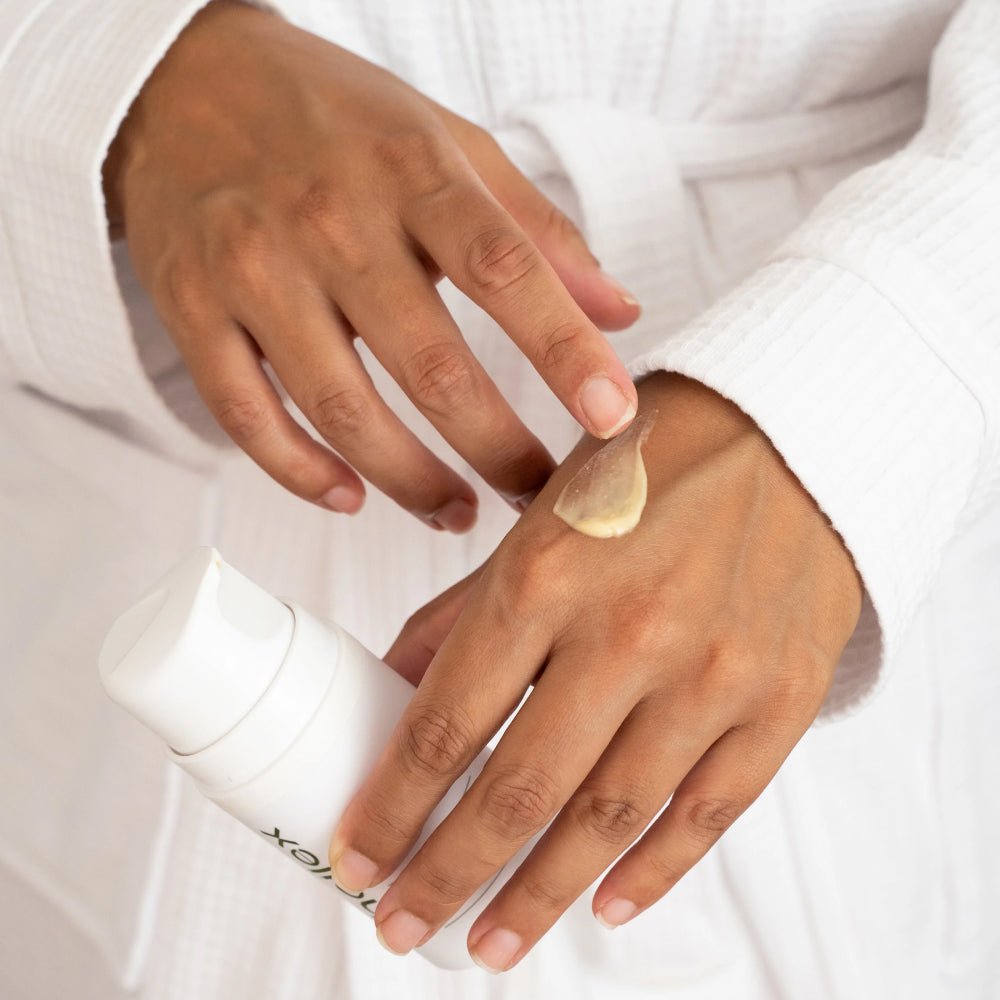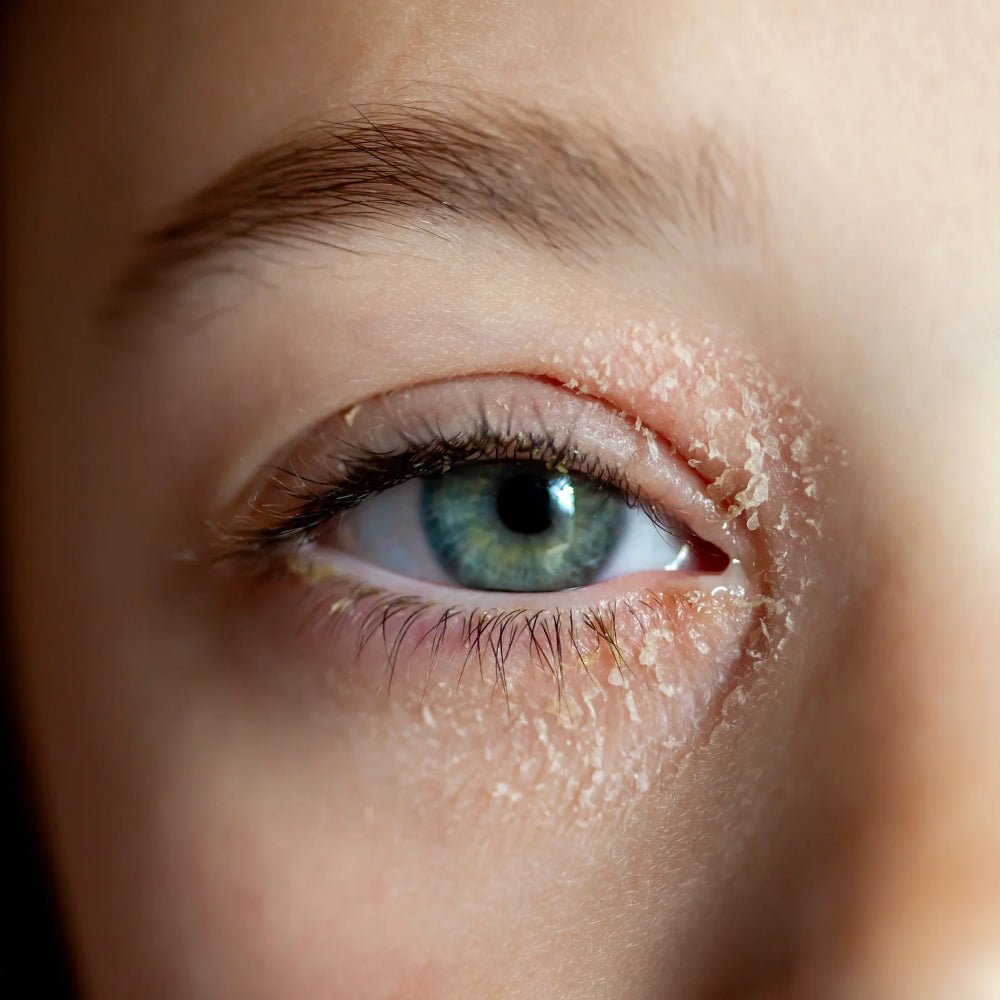Eczema symptoms often worsen as temperatures rise with the arrival of spring. Seasonal changes may have a huge influence on skin health, so it's critical to know what causes these flare-ups this time of year. This blog post will help you identify triggers and manage your spring eczema effectively.
Why Does My Eczema Flare Up in Spring?
Spring eczema flare-ups can be influenced by various environmental factors (Ayren Jackson-Cannady, 2023, HealthCentral). Here are the main ones:
-
Environmental irritant increase: Environmental irritants: Pollen levels rise significantly during spring as trees and plants bloom, commonly triggering eczema flare-ups. Pollen can overstimulate your immune system, exacerbating eczema and skin irritation. Additionally, pollen can penetrate your skin, aggravating the itch associated with eczema. To reduce exposure, use an air purifier at home, limit time outdoors, shower and moisturize after spending time outside. Avoid wearing garments dried outdoors, as they may carry pollen.
-
Heat and humidity: Eczema may be triggered by temperature swings. Excessive sweating also exacerbates eczema symptoms. To avoid eczema irritation in the spring, dress in loose-fitting cotton and layer your clothing to accommodate temperature variations. Use air conditioning with caution, since it might dry up the air and aggravate eczema. Humidifiers keep skin moisturized; however, it should be cleaned often to prevent mold growth.
-
More sun exposure: Moderate sun exposure can improve mood, but too much exposure can dry your skin out and increase eczema flare-ups. To counteract the effects of prolonged exposure to the sun, steer clear of the hot afternoon hours when the sun is at its zenith. Additionally, use sunscreen that has an SPF of 30 or higher, ensure that sunscreen is safe for those with eczema and won't cause irritation. Remember to reapply your sunscreen often while swimming in the sun.
Common Eczema Symptoms
There are seven types of eczema, according to the National Institute of Arthritis and Musculoskeletal and Skin Diseases, the most prominent kind is atopic dermatitis (AD). Although eczema may occur anywhere on your body, some people are at a greater risk of it appearing in certain areas of the body. Eczema flare-ups will lead to dry, itchy, red, and irritated skin. The impacted areas may also thicken over time (Kolb & J. Ferrer-Bruker, 2024)
Trying to scratch the affected regions could satisfy your need for relief, but seeping, crusting, or bleeding will make the issue worse. Consequently, the infection and its symptoms may worsen.
6 Home Remedies to Prevent Spring Eczema From Flaring Up
Using home remedies can also prevent spring eczema. Here are six tips to reduce flare-ups and improve skin health.
-
Avoid Environmental Triggers: Try to limit your time outside when pollen levels are high and take steps to reduce exposure to irritants such as dust and mold. Consider reducing air conditioning use, as it can dry out your skin.
-
Maintain a Consistent Skincare Routine: It's important to moisturize and protect your skin from the sun every day. Unscented products are best. Don’t forget to add moisturizer after a shower.
-
Avoid Irritants and Allergens: Avoid strong fragrances or harsh chemicals in your skincare products, as they can trigger symptoms.
-
Select Light, Natural Fabrics: Friction and sweat can exacerbate eczema. Choose breathable fabrics, such as cotton, to keep irritation away.
-
Enhance Your Diet: Focus on foods rich in antioxidants and anti-inflammatory properties. Avoid high-histamine foods that may exacerbate symptoms.
-
Practice Stress Management: Try doing activities like meditation, gentle exercise, and getting good sleep to help control stress. Additionally, you can use Liverty Dynamic Drops and Active ReLeaf Spot Gel targeting internal inflammation in the nervous system to support healthier skin from within.
Trust Phoilex for Safe and Lasting Relief
Spring presents unique challenges for eczema sufferers, such as exposure to environmental irritants and temperature changes. Using effective treatments along with proactive skincare could help alleviate these issues. Explore Phoilex’s products to help ease the symptoms caused by spring eczema and support your skin health.
Most of all, don’t forget to seek advice from a medical professional to determine the most suitable solutions for your specific situation.
FAQs:
Q: How can I tell if my eczema flare-up is triggered by spring allergies?
A: Spring allergy-triggered eczema typically coincides with increased pollen counts and may be accompanied by other allergy symptoms like sneezing or itchy eyes. Look for skin irritation that worsens after spending time outdoors or on high pollen count days, and note if symptoms improve when taking allergy medications or staying indoors.
Q: What are the most effective ways to protect my skin from spring pollen?
A: Use an air purifier in your home and avoid drying clothes outside where they can collect pollen. After being outdoors, take a shower to remove pollen from your skin and hair, then apply moisturizer immediately while your skin is still damp to lock in hydration.
Q: How should I adjust my skincare routine during spring to prevent eczema flares?
A: Focus on maintaining skin moisture with regular application of appropriate moisturizers and consider using a humidifier to combat dry air from air conditioning. Choose lightweight, breathable clothing layers that can be adjusted with temperature changes, and be vigilant about applying eczema-safe sunscreen when spending time outdoors.
Q: Can spring sun exposure help or worsen my eczema symptoms?
A: While moderate sun exposure can sometimes improve eczema symptoms, excessive exposure can trigger flares by drying out the skin and causing overheating. Limit sun exposure during peak hours (10 am to 4 pm) and always use an eczema-friendly sunscreen with SPF 30 or higher.
Q: What should I do when spring humidity triggers my eczema?
A: Manage humidity-triggered eczema by wearing loose-fitting, cotton clothing that allows your skin to breathe and wicks away sweat. Use air conditioning strategically to reduce humidity, but balance it with a clean humidifier to prevent the air from becoming too dry.
Q: How can I manage spring eczema flares while staying active outdoors?
A: Choose cooler times of day for outdoor activities, such as early morning or evening, to minimize sweating and sun exposure. Wear appropriate protective clothing, bring a clean towel to pat away sweat, and shower promptly after exercise to remove potential irritants from your skin.
References:
-
Ayren Jackson-Cannady. (2023, May 12). 4 ways seasonal changes affect your eczema. HealthCentral. https://www.healthcentral.com/condition/eczema/how-seasonal-changes-affect-eczema
-
Freeborn, J. (2023, March 2). Eczema: Tips on how to manage atopic dermatitis in spring and summer. Medicalnewstoday.com; Medical News Today. https://www.medicalnewstoday.com/articles/tips-for-eczema-management-in-spring-and-summer#Common-eczema-symptoms
-
Kolb, L., & J. Ferrer-Bruker, S. (2024). Atopic Dermatitis. https://www.ncbi.nlm.nih.gov/books/NBK448071/
-
National Eczema Association. (2013). Eczema treatment. National Eczema Association. https://nationaleczema.org/eczema/treatment/
-
National Institute of Arthritis and Musculoskeletal and Skin Diseases. (2024). Atopic Dermatitis. Google.com. https://www.niams.nih.gov/health-topics/atopic-dermatitis
Read more

Eczema and allergic reactions may appear similar at first but differ significantly in their triggers and symptoms. While eczema is often linked to genetics or environmental factors, allergic reacti...

Eye eczema can be frustrating and even painful, often causing discomfort such as irritation and redness. The dermatological condition usually manifests as dry or itchy skin on the eyelids. Genetic ...
